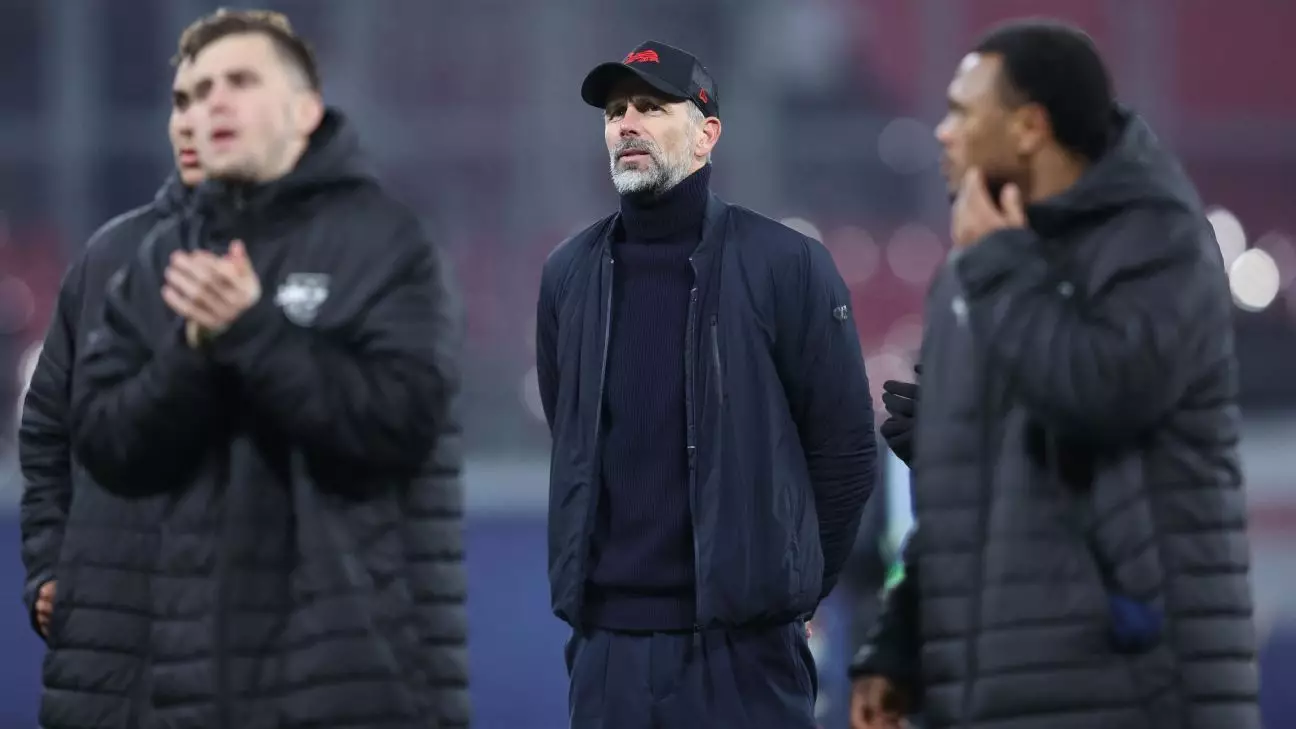In the world of football, the concept of finding the right fit— or “passen,” as the Germans would say— is paramount. This idea resonates with the strategic maneuvers that clubs make when appointing managers, particularly at a club like RB Leipzig, which has seen its fair share of turnover in the coaching department. Marco Rose represents a unique case study in this regard, serving not only as a coach, but as a symbol of what it means to align with a club’s ethos while navigating the harsh realities of competitive football.
Marco Rose’s ties to RB Leipzig run deeper than just statistics and results; they are intertwined with his identity as a Leipziger. Growing up in the city accentuated Rose’s understanding of the club’s vision and operational framework. Having previously managed RB Salzburg, he brings a familiarity with the Red Bull system, making him particularly well-suited for the role. Unlike predecessors who adhered strictly to rigid tactical frameworks, Rose adopts a more adaptable approach. His tactical flexibility allows him to pivot according to the demands of any given match, which stands in contrast to the expectations often set for high-profile managers.
An indication of Rose’s successful adaptation is his impressive tenure at Leipzig. With over 826 days in the role, he is achieving a remarkable level of stability in a club typically marked by swift managerial changes. Rose’s philosophy incorporates elements of Gegenpressing and transitional football with a dose of pragmatism, suggesting that he prioritizes results over style. This balance has been crucial in establishing a tangible identity for Leipzig amid the whirlwind of modern football.
Achievements and Challenges
The past couple of seasons have been somewhat of a paradox for Rose and Leipzig. While he has led the team to significant achievements, including triumphs in both the DFB-Pokal and the DFL-Supercup, the 2023-2024 UEFA Champions League campaign has proven to be a sobering experience. With a dismal record of six games and six losses, the Champions League has become a painful reminder that aspirations must sometimes yield to the realities of performance. The initial setbacks against traditional heavyweights like Atletico Madrid and Juventus were perhaps forgivable, but the defeat at Celtic Park represented a nadir for a club with lofty ambitions.
Injuries have disrupted the squad’s cohesion, with key players like Xavi Simons and David Raum sidelined. These absences can create a precarious situation for any coach, where the margin for error is razor-thin. The pressure to perform enhances with every underwhelming match, especially as discussions about Rose’s future recommence.
As Leipzig gears up for crucial matches ahead, the DFB-Pokal quarterfinal against Eintracht Frankfurt looms large. A loss could imply serious repercussions for Rose, with whispers of managerial changes growing louder. The recent victory over Frankfurt, in which newcomers Loïs Openda and Benjamin Sesko shone brightly, managed to quell some of the immediate doubts regarding Rose’s position. However, the shadow of uncertainty continues to hover, particularly as the Winterpause approaches.
Concurrently, the specter of managerial replacements is ever-present. Figures like Roger Schmidt have emerged as potential successors, given their past engagements with the Red Bull network. In this landscape of speculation, seasoned managers such as Erik ten Hag also draw attention. The question remains whether Leipzig’s management, led by Oliver Mintzlaff, will act swiftly in anticipation of potential changes at the top, especially with Jürgen Klopp poised to take on a significant role within the Red Bull umbrella come January.
Despite their recent struggles, RB Leipzig remains a formidable force in German football. Their DFB-Pokal draw suggests an optimistic future; with Bayern Munich and Borussia Dortmund already eliminated, Leipzig may find their path unobstructed. Moreover, Bayer Leverkusen’s form demands respect, making them a potential hurdle for Leipzig’s aspirations. The unpredictability of cup competitions adds an extra layer of excitement, with every team, even those from lower divisions, presenting real threats.
As emerging teams display resilience and tactical ingenuity—like St. Pauli, who is traditionally seen as a dark horse—it’s clear that the landscape of German football is changing. The transformation experienced by St. Pauli under Alexander Blessin showcases how agility can lead to survival amidst stern competition, which is a lesson that not only Leipzig but other clubs must heed as the season progresses.
Marco Rose’s tenure encapsulates the continuous negotiation between aspiration and reality. Whether he’s able to maintain his position amid increasing scrutiny will depend on whether he can harness the potential within his squad while addressing the challenges that invariably arise in a sport defined by unpredictability. The upcoming fixtures will certainly test his mettle, but with the right alignment of ambition, pragmatism, and tactical flexibility, RB Leipzig can once again aspire to be the club that matches its lofty goals.

